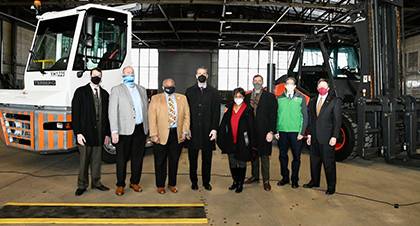
The Helen Delich Bentley Port of Baltimore has been awarded a $1.8 million grant from the U.S. Environmental Protection Agency (EPA) for the Port’s Diesel Equipment Upgrade Program, which replaces older cargo-handling equipment and dray trucks with newer, cleaner, and more efficient models. The grant will help the Maryland Department of Transportation Maryland Port Administration (MDOT MPA) further reduce emissions at the Port and surrounding residential neighborhoods.
“Maryland’s Port of Baltimore has a robust environmental program, from reducing emissions to restoring Chesapeake Bay islands, while also serving as a tremendous catalyst for good jobs and economic growth,” said Governor Larry Hogan.
“This $1.8 million EPA grant from the Diesel Emission Reduction Act gives Maryland’s Port of Baltimore an important tool in our ongoing efforts to be greener and to advance Maryland’s response to climate change,” said MDOT Deputy Secretary Earl Lewis, who also serves as Chair of Maryland’s Zero Emission Electric Vehicle Infrastructure Council. “Upgrading equipment and reducing emissions at the Port and in nearby communities is a win-win.”
The EPA grant comes from the Diesel Emission Reduction Act (DERA), and will assist replacement of several pieces of diesel-powered equipment that operate at the Port, including four yard trucks, six forklifts, one mobile welding unit and three heavy duty dray trucks, with newer and more energy-efficient equipment. The new dray trucks will be the first electric powered dray trucks to provide service at Maryland’s Port of Baltimore.
“These funds are a big boost for clean air and climate progress and that’s great news for Baltimore communities and Maryland economies," Maryland Environment Secretary Ben Grumbles said. "We thank EPA, MDOT MPA and all the partners of Maryland’s green port who are advancing the state’s climate and environmental justice goals by investing in our clean energy economy.”
Since the Port’s Diesel Equipment Upgrade Program began in 2008, a total of 118 pieces of diesel cargo-handling equipment such as forklifts, top loaders, locomotives, and tugs have been replaced or retrofitted with cleaner engines. These replacements and retrofits have prevented more than 5,100 tons of emissions.
Additionally, the Port’s Dray Truck Replacement Program, part of the Diesel Equipment Upgrade Program, was launched in 2012 and has replaced more than 275 trucks with cleaner, modern vehicles. Dray trucks move containerized cargo short distances to and from ports to distribution facilities and warehouses. The Port of Baltimore last received an EPA DERA grant in 2019.
“These cleaner trucks and heavy equipment help deliver protections for those that need it most, such as the people living and working near ports,” said EPA Mid-Atlantic Regional Administrator Adam Ortiz. “Thanks to the Diesel Emissions Reduction Act Grant Program, we are making historic investments into communities that are overburdened by pollution to address legacies of environmental injustice.”
“This new EPA grant will further the highly successful diesel and greenhouse gas emission reduction programs at the Port of Baltimore,” said Shawn Kiernan, acting general manager for MDOT MPA’s Office of Environmental Quality. “We are grateful to our community and stakeholder partners, maritime businesses, and state agencies for their continued collaboration and support of our work to improve air quality.”
Last year, MDOT MPA renewed and expanded a voluntary Memorandum of Understanding (MOU) with the Maryland Department of the Environment and the Maryland Energy Administration to strengthen environmental initiatives at the Port of Baltimore’s state-owned, public marine terminals. The agreement includes a continued effort to reduce diesel and greenhouse gas emissions and increase energy efficiency at the Port.
MDOT MPA has also been recognized for its creative efforts to restore and protect water quality using innovative stormwater restoration techniques, such as an innovative algal flow-way device that removes excess nutrients from Baltimore Harbor. MDOT MPA has also helped restore an eroded stream at the Maryland Zoo in Baltimore, constructed a living shoreline at an Anne Arundel County school and partnered with a local nonprofit to plant 1,500 trees around Baltimore.
“As a neighbor to one of the busiest ports in the nation, the Turner Station Conservation Team applauds the Port of Baltimore for being awarded another EPA Diesel Emission Reduction Act grant,” said Turner Station Conservation Team Board Member Edie Brooks. “This will help the Port continue its steady progress toward improving air quality in the Baltimore region.”
The Port generates about 15,300 direct jobs, with nearly 140,000 jobs overall linked to Port activities. The Port ranks first among the nation’s ports for volume of autos and light trucks, roll on/roll off heavy farm and construction machinery, and imported gypsum. It ranks 11th among major U.S. ports for foreign cargo handled and 10th for total foreign cargo value.




